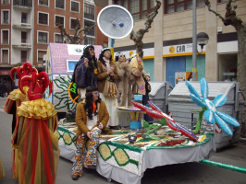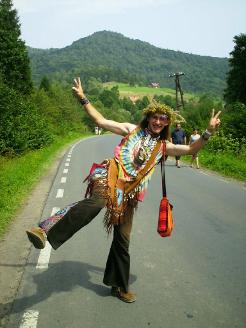| |  The hippie subculture was originally a youth movement that began in the United States during the mid-1960s and spread around the world. The word hippie derives from hipster, and was initially used to describe people who created their own communities, listened to psychedelic rock, embraced the sexual revolution, and used drugs such as cannabis and LSD to explore alternative states of consciousness. The hippie subculture was originally a youth movement that began in the United States during the mid-1960s and spread around the world. The word hippie derives from hipster, and was initially used to describe people who created their own communities, listened to psychedelic rock, embraced the sexual revolution, and used drugs such as cannabis and LSD to explore alternative states of consciousness.
On January 1967, the Human Be-In at Golden Gate Park in San Francisco popularized hippie culture, leading to the legendary Summer of Love on the West Coast of the United States, and the 1969 Woodstock Festival on the East Coast. In Mexico, the jipitecas formed La Onda Chicana and gathered at Avándaro, while in New Zealand, nomadic housetruckers practiced alternative lifestyles and promoted sustainable energy at Nambassa. In the United Kingdom, mobile "peace convoys" of New age travellers made summer pilgrimages to free music festivals at Stonehenge. In Australia hippies gathered at Nimbin for the 1973 Aquarius Festival and the annual Cannabis Law Reform Rally or MardiGrass. In Chile, "Festival Piedra Roja" was held in 1970 (following Woodstock's success), and was the major hippie event in that country.
Hippie fashions and values had a major effect on culture, influencing popular music, television, film, literature, and the arts. Since the 1960s, many aspects of hippie culture have been assimilated by mainstream society. The religious and cultural diversity espoused by the hippies has gained widespread acceptance, and Eastern philosophy and spiritual concepts have reached a wide audience. The hippie legacy can be observed in contemporary culture in myriad forms - from health food, to music festivals, to contemporary sexual mores, and even to the cyberspace revolution.
• Summer of Love (1967)
On January 14, 1967, the outdoor Human Be-In organized by Michael Bowen[44] helped to popularise hippie culture across the United States, with 20,000 hippies gathering in San Francisco's Golden Gate Park. On March 26, Lou Reed, Edie Sedgwick and 10,000 hippies came together in Manhattan for the Central Park Be-In on Easter Sunday. The Monterey Pop Festival from June 16 to June 18 introduced the rock music of the counterculture to a wide audience and marked the start of the "Summer of Love." Scott McKenzie's rendition of John Phillips' song, "San Francisco", became a hit in the United States and Europe. The lyrics, "If you're going to San Francisco, be sure to wear some flowers in your hair", inspired thousands of young people from all over the world to travel to San Francisco, sometimes wearing flowers in their hair and distributing flowers to passersby, earning them the name, "Flower Children." Bands like the Grateful Dead, Big Brother and the Holding Company (with Janis Joplin), and Jefferson Airplane continued to live in the Haight, but by the end of the summer, the incessant media coverage led the Diggers to declare the "death" of the hippie with a parade. According to the late poet Susan 'Stormi' Chambless, the hippies buried an effigy of a hippie in the Panhandle to demonstrate the end of his/her reign.
Regarding this period of history, the July 7, 1967, Time magazine featured a cover story entitled, "The Hippies: The Philosophy of a Subculture." The article described the guidelines of the hippie code: "Do your own thing, wherever you have to do it and whenever you want. Drop out. Leave society as you have known it. Leave it utterly. Blow the mind of every straight person you can reach. Turn them on, if not to drugs, then to beauty, love, honesty, fun." It is estimated that around 100,000 people traveled to San Francisco in the summer of 1967. The media was right behind them, casting a spotlight on the Haight-Ashbury district and popularizing the "hippie" label. With this increased attention, hippies found support for their ideals of love and peace but were also criticized for their anti-work, pro-drug, and permissive ethos.
By the end of the summer, the Haight-Ashbury scene had deteriorated. The neighborhood could not accommodate the influx of crowds (mostly naive youngsters) with no place to live. Many took to living on the street, panhandling and drug-dealing. There were problems with malnourishment, disease, and drug addiction. Crime and violence skyrocketed. By the end of 1967, many of the hippies and musicians who initiated the Summer of Love had moved on. Misgivings about the hippie culture, particularly with regard to drug abuse and lenient morality, fueled the moral panics of the late 1960s.
• Politics
 Hippies were often pacifists and participated in non-violent political demonstrations, such as civil rights marches, the marches on Washington D.C., and anti-Vietnam War demonstrations, including draft card burnings and the 1968 Democratic National Convention protests. The degree of political involvement varied widely among hippies, from those who were active in peace demonstrations to the more anti-authority street theater and demonstrations of the Yippies, the most politically active hippie sub-group. Bobby Seale discussed the differences between Yippies and hippies with Jerry Rubin who told him that Yippies were the political wing of the hippie movement, as hippies have not "necessarily become political yet". Regarding the political activity of hippies, Rubin said, "They mostly prefer to be stoned, but most of them want peace, and they want an end to this stuff." Hippies were often pacifists and participated in non-violent political demonstrations, such as civil rights marches, the marches on Washington D.C., and anti-Vietnam War demonstrations, including draft card burnings and the 1968 Democratic National Convention protests. The degree of political involvement varied widely among hippies, from those who were active in peace demonstrations to the more anti-authority street theater and demonstrations of the Yippies, the most politically active hippie sub-group. Bobby Seale discussed the differences between Yippies and hippies with Jerry Rubin who told him that Yippies were the political wing of the hippie movement, as hippies have not "necessarily become political yet". Regarding the political activity of hippies, Rubin said, "They mostly prefer to be stoned, but most of them want peace, and they want an end to this stuff."
In addition to non-violent political demonstrations, hippie opposition to the Vietnam War included organizing political action groups to oppose the war, refusal to serve in the military and conducting "teach-ins" on college campuses that covered Vietnamese history and the larger political context of the war.
Scott McKenzie's 1967 rendition of John Phillips' song "San Francisco (Be Sure to Wear Flowers in Your Hair)", which helped inspire the hippie Summer of Love, became a homecoming song for all Vietnam veterans arriving in San Francisco from 1967 on. McKenzie has dedicated every American performance of "San Francisco" to Vietnam veterans, and he sang at the 2002 20th anniversary of the dedication of the Vietnam Veterans Memorial. "San Francisco" became a freedom song worldwide, especially in Eastern European nations that suffered under Soviet-imposed communism.
 Hippie political expression often took the form of "dropping out" of society to implement the changes they sought. Politically motivated movements aided by hippies include the back to the land movement of the 1960s, cooperative business enterprises, alternative energy, the free press movement, and organic farming. Hippie political expression often took the form of "dropping out" of society to implement the changes they sought. Politically motivated movements aided by hippies include the back to the land movement of the 1960s, cooperative business enterprises, alternative energy, the free press movement, and organic farming.
The political ideals of the hippies influenced other movements, such as anarcho-punk, rave culture, green politics, stoner culture and the new age movement. Penny Rimbaud of the English anarcho-punk band Crass said in interviews, and in an essay called The Last Of The Hippies, that Crass was formed in memory of his friend, Wally Hope.[78] Rimbaud also said that Crass were heavily involved with the hippie movement throughout the 1960s and Seventies, with Dial House being established in 1967. Many punks were often critical of Crass for their involvement in the hippie movement. Like Crass, Jello Biafra was influenced by the hippie movement and cited the yippies as a key influence on his political activism and thinking, though he did write songs critical of hippies.
| |



